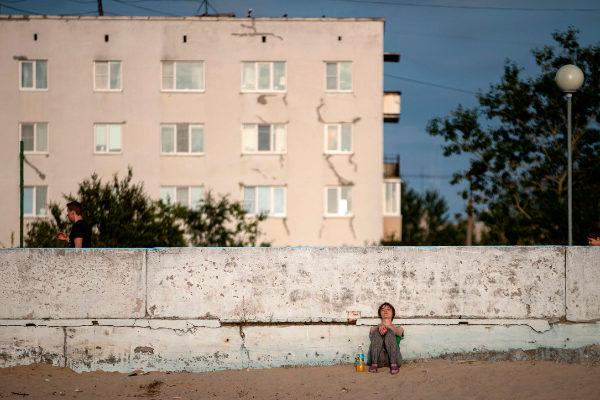- Evacuation: Nyonoksa, the 'radioactive town': they cancel the evacuation but some neighbors leave
- Rediation: Fear of a new Chernobyl after exploding Russian missiles
- Explosion: At least two dead and six injured by an explosion in a military estate in northern Russia
The 'Chernobyl' series, which chronicles the panic and concealment of the worst nuclear accident of the 20th century, has pinched the memory of many Russians. Last Thursday the neighbors of Nyonoksa, a town of half a thousand inhabitants in the Russian Arctic, woke up in a kind of second season of the series. There was an explosion of a nuclear cruise missile during tests. Five engineers and two more people died, probably military. The pollution took two hours to reach Severodvinsk, the nearest city.
It is not yet known exactly what happened. "We do not believe anyone, this is a national crisis," Aleksei Klimov, an ecologist, professor and local historian based in Severodvinsk, tells this WORLD, to which this village is attached. There 185,000 neighbors live pending continuous contradictory versions whose first installment was the same as in the series: something has happened, but nothing happens.
The first day they saw the helicopters hum over their heads. Only later did they find out, in many cases from relatives who called from Moscow, what was happening. Severodvinsk radiation detectors rose 4 to 16 times their usual value. With some delay the official version was giving the reason for the initial alarm, until on Tuesday the authorities invited the residents of Nyonoksa to leave the town on the grounds that there were going to be "military operations" in the area that were later canceled.
The town is next to the polygon where it exploded what according to US specialists could be a prototype of the new Burevestnik cruise missile. Although the evacuation, which caused uncomfortable headlines throughout the country, was aborted at the last moment, several neighbors have confirmed to this newspaper that many have left town, proud of their beautiful wooden churches: "And those who have returned what they have done without the children, "explains Klimov, who is angry at the regional authorities, for erasing the first radiation data from the internet: " Our rulers were scared, they did not tell the truth, they are irresponsible. "
Several witnesses saw how three of those injured in the explosion were sent on an emergency flight to Moscow for treatment, and those who accompanied them wore protective suits. There were rumors that several hospitals had refused to accept them for fear of contamination, and radiation was found in the gowns of the doctors who treated them. On Friday it was learned that the authorities had decreed the closure for a month of the White Sea Bay that bathes this cold coast, as significant amounts of rocket fuel have been found in the water.
"It seems that everyone here had seen 'Chernobyl'," confirms Marina Vasilieva, a neighbor of Severodvinsk, when she narrates how people have lived these days: the city's pharmacies sold in a few hours all their iodine stocks, chemical element that It helps prevent the absorption of radioactive isotopes. "Alcohol also sold a lot, people decided to stay in their homes," says another neighbor.
"There is no panic, but people are worried and the military tries to keep everything secret," says Marina Vasilieva. Severodvinsk is what in Russia is known as a 'closed city', where foreigners are prohibited from passing without a special permit. Ecologists have warned for years of rising radiation levels in nearby waters. The origin is in two large naval shipyards that build and repair nuclear-powered submarines and other ships. They are a threat to health, "but at the same time the main industry of the city," admits another neighbor.
In Nyonoksa, where evacuations occur more than once a year for matters related to Army activities, many have remembered these days the last time the sky thundered over this town. It was December 2015, and a test of a cruise missile went wrong, throwing the projectile against the fourth floor of an apartment building. There were no victims and no radiation was reported. "That was an accident, but what has happened this time is an uncontrolled risk, people were in a state of 'shock'," complains Klimov, who expects "Moscow to wake up once before the problem." If the wind would have blown towards us, what would have happened? "
According to the criteria of The Trust Project
Know more- Chernobyl
- Russia
- Nuclear energy
RussiaNyonoksa, the 'radioactive people': they cancel the evacuation but some neighbors leave
The Counter-Chronicle The mysterious leak of radioactive material from a Russian nuclear power plant
Russia: Fear of a new Chernobyl after Russian missiles explode

